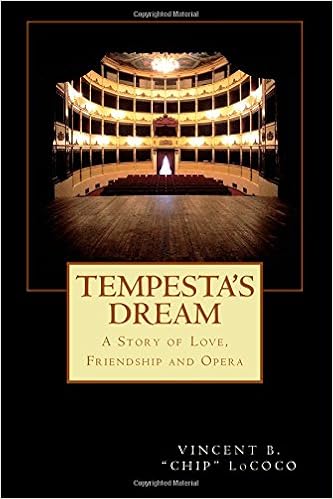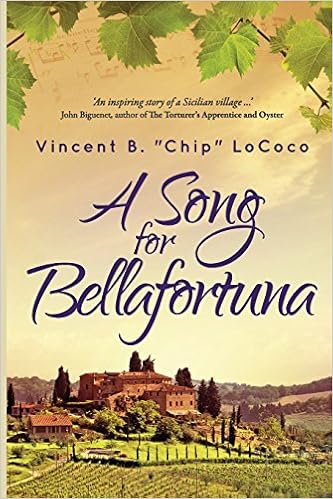Greetings, commies and libbies!
Today I am thrilled to feature an award-winning and
bestselling author of historical musical fiction, Vincent LoCoco. He lives and
practices law in New Orleans. His other
passions include opera and literature. No wonder he wed his two passions in his
books, Tempesta’s Dream and A Song for Belafortuna.
__________________________________________
MJN: At a
closer look, the subtitle of Tempesta's Dream - a story of Love,
Friendship and Opera - is a little paradoxical. Coming from a family of
classical musicians, anything involving opera would be modified with words like
"rivalry" and "backstabbing". Perhaps, Italians are more
forgiving and generous that Russians?
VL: Oh, I am sure the
competitive spirit runs amuck in the opera world. As for my novel, the subtitle refers to the
characters in the opera.
Love – Giovanni Tempesta falls in love with Isabella, the girl who
he has always dreamed of in his operatic worldview. He grew up on operas, and
strongly believes at love at first sight.
Friendship – Alfredo, a blind retired singer at the Casa di Riposa,
takes young Giovanni under his wing and teaches him how to sing opera, but more
importantly, a friendship is formed that transforms both of them.
Opera – The real protagonist of the story. The story was a means by
which I could pass along my adoration and passion for opera to my readers.
MJN: In
the past months I have interviewed several other authors whose novels revolve
around careers of musicians, including The Red Priest's Annina. Would
you say that historical novels with a musical theme are their own category?
VL: I could not agree
more. I am known as an Italian Historical Fiction writer, which is the closest
to describe it, although not perfect. I really think I am more a Musical
Historical Fiction writer. There have been so many before me, who have written
about composers, conductors, singers and such. It really should be it’s own
category.
MJN: You
currently live in New Orleans, which has been a pilgrimage site for many
authors, artists and musicians seeking inspiration. Tell us about the
effect that the city has on you.
VL: It’s true I live in
New Orleans, but more than that I was born and raised here. So I am fully
confident that what I am about to say is biased. So be it. I have travelled a
lot, been to many different cities, and no where, and I mean no where, do you
get anything like the French Quarter. This is the Latin Quarter in Puccini’s La
Boheme. A place where tourists walk over the same stones that the Pirate Jean
Lafitte strolled, and came up with his plan to try to rescue Napoleon from
exile. A place where ghosts feel just at real as the tourists. Many a times I
take computer down to the Quarter, find an outside café, get a coffee, and
transport myself to Europe and began the writing journey. It is a magical city.
MJN: Tell
us a little bit about the awards that your books have won. I'm talking
about the 2014 Pinnacle Achievement Award in Historical Fiction. When you
submitted your novel for consideration, did you think that you had a high
chance of winning the award? Would it be beneficial to read novels who
won in the prior years, just to get an idea of what the judges' tastes are
like?
VL: I would not spend
my time reading novels to see what the Judges like. I think it’s more important
to make sure your novel is the best it can be, and is ready for submission.
Here is an example. An early draft of my second novel, A Song for Bellafortuna,
was submitted to the William Faulkner Writing Competition. It was named as a
Short List Finalist. Then the novel went through a major revision with my agent
in New York. It became a great book. I often wonder if I had submitted it after
those revisions, would it have had a better chance of winning. My advice, leave
nothing on the table. Make sure your book is ready to go.
MJN: Your
novels are set in the country of your ancestors. One of my early loves was an
Italian gentleman, who defied every stereotype imaginable - lethargic, blond,
blue-eyed, Protestant. He hated his mother and pasta. A living negation
of every Italian stereotype! Are there any pervasive ethnic stereotypes that
you hope to counter through your literature? Or do you occasionally
indulge the unenlightened masses and give them what they expect in terms of
portrayal of Italians?
VL: He hated his mother
and pasta. There is no such Italian man. This is a great question and one that
really made me think. Of course, we all have Italian stereotypes in our minds.
But the more I pondered this question, I think my answer would be that the
story’s protagonist and the locale is usually set first. Then the story
develops as the character develops in the story. That is the fun part of
writing. When the story begins to take you places you never expected it to. I
remember reading a letter J.R.R. Tolkien wrote one day when he was at work in
the early stages of Lord of the Rings. He stated in that letter that he had
just introduced Black Riders into the story, and he could not wait to get back
to writing to discover more about them. Writing is a journey. So, at least for
me, I don’t think I write from stereotypes, but instead just follow the story
where it leads.
Thanks for taking the time to get to know a little bit about my
writing career and me.


No comments:
Post a Comment